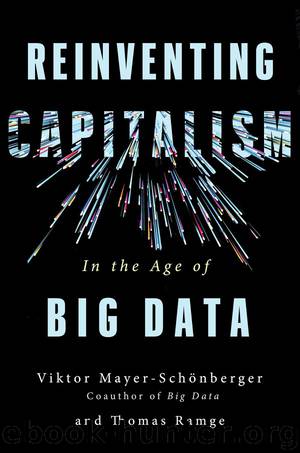Reinventing Capitalism in the Age of Big Data by Viktor Mayer-Schönberger & Thomas Ramge

Author:Viktor Mayer-Schönberger & Thomas Ramge
Language: eng
Format: epub
Publisher: Basic Books
Published: 2018-02-27T05:00:00+00:00
THE DEMISE OF MONEY AS THE MARKET’S PREEMINENT conveyor of information will also prompt a decline in the role of capital. In our market system, financial capital is key because it is such a fungible factor of production: when necessary, it can easily be exchanged for a much-needed resource and vice versa, thereby enabling efficient resource use.
But capital also conveys information. It signals to the world that a company has an asset at its disposal that it can exchange for other factors of production. It connotes freedom of choice as well as relative power. Outside investment increases a company’s flexibility, and it also conveys further information—about the prowess of the company as well as the trust that an investor has in it.
Sometimes, the informational dimension of an outside investment may be more valuable than the capital inflow itself. When a highly respected venture capital (VC) firm such as Sequoia Capital invests in a Silicon Valley start-up, it’s akin to conferring a peerage in nineteenth-century England: the recipient gets immediate name recognition and often gains additional market value as a result.
As markets embrace diverse information streams, these two functions of capital—information and value—are no longer necessarily intertwined. Rather, they will more frequently be separated. The point here is not to suggest that in the future, capital will have no role to play. Capital in its function as value will continue to be useful in our economy. But it will no longer be the only information game in town.
When we disconnect the two functions of capital, we realize that their relative importance depends on context. For example, at times a company may need an actual influx of capital. But in other situations, giving a signal to the market that a widely trusted expert believes in the business is precisely what is needed. To be sure, not all signals are equally honest. Talk is cheap and a recommendation nobody believes is not worth much, especially when compared to an endorsement backed up by a much-coveted fat check. In contrast, an honest signal carries a cost that deters potential abusers. Money isn’t always an honest signal, nor is it the only one. When money is abundant, for instance, the informational value of such a signal is greatly reduced. And as MIT professor Sandy Pentland has argued, a wide variety of signals, including those generated from network and social media data, can be honest.
The rewired market will have no problem ingesting and conveying such signals, and market participants will have no difficulty factoring such signals into their computer-assisted decision-making (of course, this does not guarantee perfect choices, only that choices reflect all available preference information). This is particularly important when money is abundant and investment opportunities are limited. At such times, a capital investment itself is no longer as strong a signal of endorsement; it has lost a portion of its informational value. Consider, for instance, a VC firm in times of abundant availability of capital that is unable to invest in a start-up it likes, because the investment round is oversubscribed.
Download
This site does not store any files on its server. We only index and link to content provided by other sites. Please contact the content providers to delete copyright contents if any and email us, we'll remove relevant links or contents immediately.
International Integration of the Brazilian Economy by Elias C. Grivoyannis(111059)
The Radium Girls by Kate Moore(12028)
Turbulence by E. J. Noyes(8049)
Nudge - Improving Decisions about Health, Wealth, and Happiness by Thaler Sunstein(7707)
The Black Swan by Nassim Nicholas Taleb(7129)
Rich Dad Poor Dad by Robert T. Kiyosaki(6632)
Pioneering Portfolio Management by David F. Swensen(6300)
Man-made Catastrophes and Risk Information Concealment by Dmitry Chernov & Didier Sornette(6019)
Zero to One by Peter Thiel(5802)
Secrecy World by Jake Bernstein(4753)
Millionaire: The Philanderer, Gambler, and Duelist Who Invented Modern Finance by Janet Gleeson(4478)
The Age of Surveillance Capitalism by Shoshana Zuboff(4292)
Skin in the Game by Nassim Nicholas Taleb(4248)
The Money Culture by Michael Lewis(4207)
Bullshit Jobs by David Graeber(4190)
Skin in the Game: Hidden Asymmetries in Daily Life by Nassim Nicholas Taleb(4007)
The Dhandho Investor by Mohnish Pabrai(3765)
The Wisdom of Finance by Mihir Desai(3747)
Blockchain Basics by Daniel Drescher(3583)
